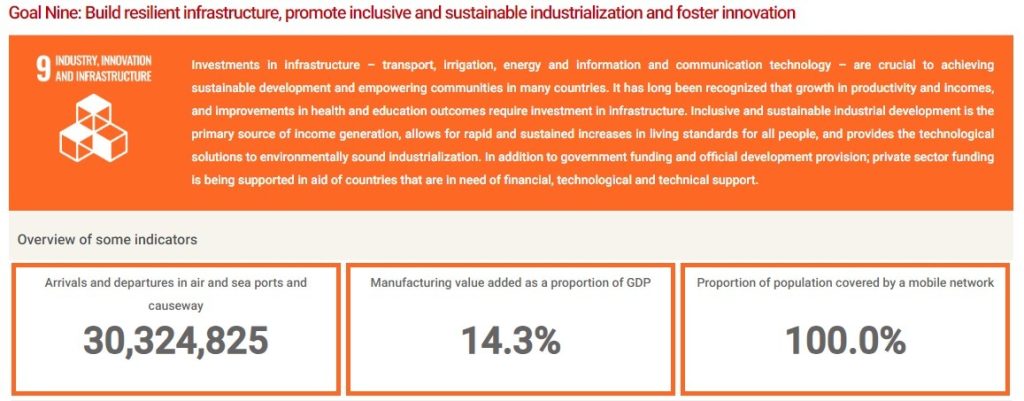SDG 9 - Industry, Innovation and Infrastructure
Gulf University is dedicated to supporting the Kingdom’s goal in attaining SDG 9, which focuses on Industry, Innovation, and Infrastructure. Through close collaboration with the government and private sector, GU is actively involved in developing and implementing inventive solutions to drive progress in technology, innovation, and infrastructure.
By establishing dedicated sustainability centers, such as the Sustainability & Development Makers Center, the Community Engagement and Continuing Education Center, and the Students Sustainability Club. And projects like Sustainable Engineering Hub, startups, and educational workshops emphasizing advancements in sustainable infrastructure, GU is playing a pivotal role in shaping a more technologically advanced and resilient future for Bahrain while contributing to the realization of SDG 9.
Through these efforts, the university is making a significant impact towards the global objective of promoting sustainable industrialization, promoting innovation, and enhancing infrastructure development for all.
The SDG 9 committed to Build resilient infrastructure, promote inclusive and sustainable industrialization and foster innovation. Bahrain has made significant advancement in digital transformation, financial sector innovation, and manufacturing sector development. The government has implemented policies such as the Personal Data Protection Law and the Cloud-First policy to foster digital innovation and improve public services. The Central Bank of Bahrain has established a dedicated unit to support FinTech innovation and launched a regulatory sandbox to facilitate experimentation. Additionally, the Industrial Sector Strategy aims to modernize the manufacturing sector by promoting Industry 4.0 and adopting circular economy principles. These initiatives demonstrate Bahrain’s commitment to a sustainable and technologically advanced future.
Digital Transformation
The Personal Data Protection Law, announced in July 2018, sets a legal framework that determines how the information of individuals should be accessed and used when it is in the possession of companies and organizations. The Cloud-First policy adopted in 2017 provides guidance for the application of advanced technology at the public sector level, allowing for reduced operational costs, increased security and productivity, alongside the development of excellent public services. In 2022, the Telecommunications Regulatory Authority launched a new Innovation License to enable live testing of new technologies and services, including 5G and IoT technologies, through a light-touch regulatory environment known as a Regulatory Sandbox.
Financial Sector Innovation
The Central Bank of Bahrain (CBB) is driving the FinTech agenda via a dedicated unit for Fintech and Innovation that is tasked with creating a conducive regulatory environment to support FinTech business models and innovation within the Kingdom’s financial services sector. The Fintech and Innovation Unit launched its regulatory sandbox in 2017, which allows for testing in the Fintech field and has issued a few FinTech related regulations including Open Banking, Crowd Funding, Crypto-assets, Robo-Advisory and others.
Manufacturing Sector Development and Sustainability
The Industrial Sector Strategy (2022-2026), launched as part of the Economic Recovery Plan, aims to support various industries, including aluminum, petrochemicals, green energy, food, pharmaceuticals, and semiconductor manufacturing. To achieve comprehensive manufacturing transformation, Bahrain is prioritizing and promoting Industry 4.0, investing in technological infrastructure, digitization, and adopting circular economy concepts.
Bahrain efforts for SDG 9

Last Updated on November 27, 2024 @ 03:24:36 pm


